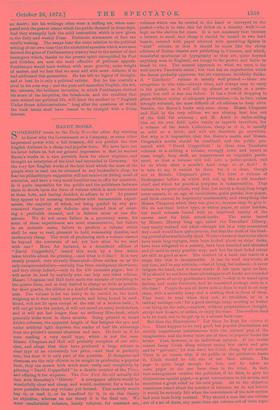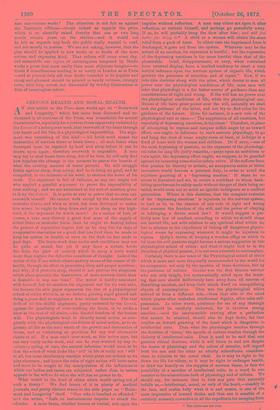HANDY BOOKS.
SOMEBODY wrote to the Daily News the other day wanting to know why the Government or a Company, or some other impersonal power with a full treasury, did not publish the best English Authors in a cheap and popular form. We have have not his letter before us, but our general impression is that he wanted Bacon's works in a nice portable form for about sixpence, and thought an enterprise of the kind had succeeded in Germany. As the very few English works of the best kind which the mass of the people wish to read can be obtained in any bookseller's shop, we fear his philanthropic suggestion will not receive its fitting meed of attention, and have a very much humbler one to offer for ourselves, Is it quite impossible for the public and the publishers between them to decide upon the form of volume which is most convenient to them both, and having decided, to adhere to it ? At present they appear to be amusing themselves with innumerable experi- ments, the majority of which, not being guided by any pre- conceived theory or any definite aim beyond that of creat- ing a profitable demand, end in failures more or leas dis- astrous. We do not mean failure in a pecuniary sense, for some of these experiments are most remunerative, but failure in an wathetic sense, failure to produce a volume which shall be easy to read, pleasant to hold, reasonably durable, and moderately cheap. The work of producing such a volume cannot be beyond the resources of art, yet how often do we meet with one? Here, for instance, is a household edition of "David Copperfield," issued this week by a firm which takes trouble about its printing,—and what is it like ? It is very clearly printed, very cleverly illustrated—Dora strikes us as the only conspicuousfailure—entirely free from catchpenny showiness, and very cheap indeed,—only 3s. for 450 immense pages ; but it will never be read by anybody who can buy any other edition. Messrs. Chapman and Hall have made the mistake of reverting to the quarto form, and as they desired to charge as little as possible for their quarto, the edition is a kind of miracle of uncomfortable- ness. The volume is far too heavy to be carried in the hand, weighing as it does nearly two pounds, and being bound in card- board, will not lie open except at the risk of a broken back ; it will not go into the pocket, it will not stand on many bookshelves, and it will not last longer than an ordinary Blue-book, which generally looks worn in three months. Being printed in broad double columns, the apparent length of line fatigues the eye, and under artificial light deprives the reader of half his advantage from the printer's unusual clearness and care. He feels as if he were reading a very small type, which is not the case. Messrs. Chapman and Hall will probably complain of our criti- cism, and allege that they have produced a large volume in clear type at an excessively low price,—and that is perfectly true, but then it is only part of the question. If cheapness and clearness are the only objects to be sought in producing a popular book, they can secure both much more easily and completely by printing "David Copperfield " in a double number of the Times, and off6ring it for sixpence. The New York Herald actually did that with Macaulay's "History." A newspaper edition would be wonderfully clear and cheap, and would, moreover, for a week be more portable than any volume yet devised. That nobody would buy it, or read it, or be benefited by it, is on this theory no objection, whereas on our theory it is the final one. We want comfortable volumes, handy volumes, for constant use,
volumes which can be carried in the hand or conveyed in the pocket—who is to take this fat fellow on a country walk 2—or kept on the shelves for years. It is not necessary that because a volume is small and cheap it should be bound in two hard boards, covered with paper adorned with sprawling figures in " loud " colours, or that it should be squat like the cheap editions of Italian classics now publishing in Florence, and which, wonderful specimens of typography as they are, quite beyond anything seen in England, are lumpy in the pocket and liable to break in two. The nearest approach to what we want is the well-known Tauchnitz series ; but that has an imperfection which the Baron probably approves, but his customers decidedly dislike. A " Tauchnitz " volume is usually well printed — there are exceptions to this rule—always clean, and always easy to carry in the pocket, as it will roll up almost as easily as a news- paper, but still it has one defect. It has a trick of dropping to pieces without notice or adequate provocation,—is, in fact, unless strongly rebound, the most difficult of all editions to keep alive. Besides, the Baron's books only seem cheap. Messrs. Chapman and Hall in the very edition we are abusing beat him out of the field for economy ; and M. Asher is under-selling him on his own field, quite vainly as regards travellers, for a volume of the Asher Collection, cheap as it is, is usually as solid as a brick, and will not therefore go anywhere. But why is it impossible that the Baron's merits and Messrs. Chapman's merits should be combined, and the public pre- sented with "David Copperfield " in three nice Tauchnitz volumes at a shilling a volume, strongly sewn and bound in some tough, limp stuff, an improvement on vegetable parch- ment, so that a volume will roll into a jacket-pocket, and be as whole after a month's hard usage as at first? It is vain to say it cannot be done, for it is done, though not at Messrs. Chapman's price. We have a volume of Shakespeare before us which will roll up like a silk handker- chief, and which for practical purposes is indestructible. That volume is, we quite admit, very dear, but surely a cheap limp tough cover cannot, in an age of caoutchouc, gutta percha, iron-paper, and thick canvas, be hopelessly unattainable, and everything else Messrs. Chapman admit they can give us, because they do give it. We do not want better type, or whiter paper, or nicer borders, but small volumes bound with an improved variety of the canvas used for kWh school-books. The series issued by Messrs. Murray long ago, called the Travellers' Library, very nearly realised our ideal—though not in a very economical way—and would have quite done so, but that the cloth of the bind- ing proved af ter wards badly dyed. We have books of that series which have made long voyages, have been kicked about on ships' decks, have been relegated to a nursery, have been tumbled and thumbed and ill-used in every possible way, and but for their faded colour are still as good as new. The comfort of a book one wants in a shape like that is inexpressible. It can be read anywhere, at any time, and in any attitude,—that of lying, for instance ; it never fatigues the hand, and it never cracks if left open upon its face. Why should we not have those advantages in all books not intended to be "parts of every gentleman's library,"—that is to stand upon shelves, and make furniture, and be consulted perhaps once in a life-time? People do not sit down now-a-days to read in an easy chair, with a movable lamp and a reading-desk in front of them. They want to read when they can, at breakfast, or in a railway carriage—oh! for a good carriage lamp, needing no bother —or lying on the sofa,—anyhow, without preparation or thought, except how to save, or utilise, or enjoy the time. The modern book is to be read, not to be put up in a solemn book-case.
But then the Illustrations ? Let them be kept for editions de luxe. These happen to be very good, but popular illustrations are usually impertinent interferences with the natural play of the imagination, and the fewer there are of them in popular books the better. That, however, is an individual opinion. If the reader cannot fancy Uriah Heep without seeing him smirk and grin and be "galvanic," let him have his Uriah Heep, by all means. There is no reason why, if the public or the publishers desire it, Uriah should be left out of our ideal edition. The page is quite large enough for him, and he takes no more paper in the one form than in the other. in fact, that arrangement enables the publisher, if he likes, to give his illustrations special paper,—a great convenience to his artists, and sometimes a great relief to his own parse. As to the objection sometimes raised about the number of volumes, we do not believe it would be seriously felt when the convenience of the new system had once been fairly realised. Why should a man lose one volume out of a set of three, any more than one volume out of three sepa-
rate one-volume works ? The objection is not felt as against the Tauchnitz editions—except indeed as regards the price, which is so absurdly raised thereby that one or two long novels remain years on the shelves—and it would not be felt as regards any book the public really wanted to read, and not merely to possess. We are not asking, however, that the plan should be applied to new books or to books of the more serious and expensivg kind. That reform will come some day, and meanwhile our re:gime of extravagance tempered by Mndie works a great deal more easily than some objectors imagine—we doubt if miscellaneous reading is as costly in London as in Paris —and at present only ask that books intended to be popular and cheap and pleasant should be printed in handy volumes, strongly sewn, with limp covers not desecrated by tawdry illustrations or dabs of meaningless colour.



































 Previous page
Previous page